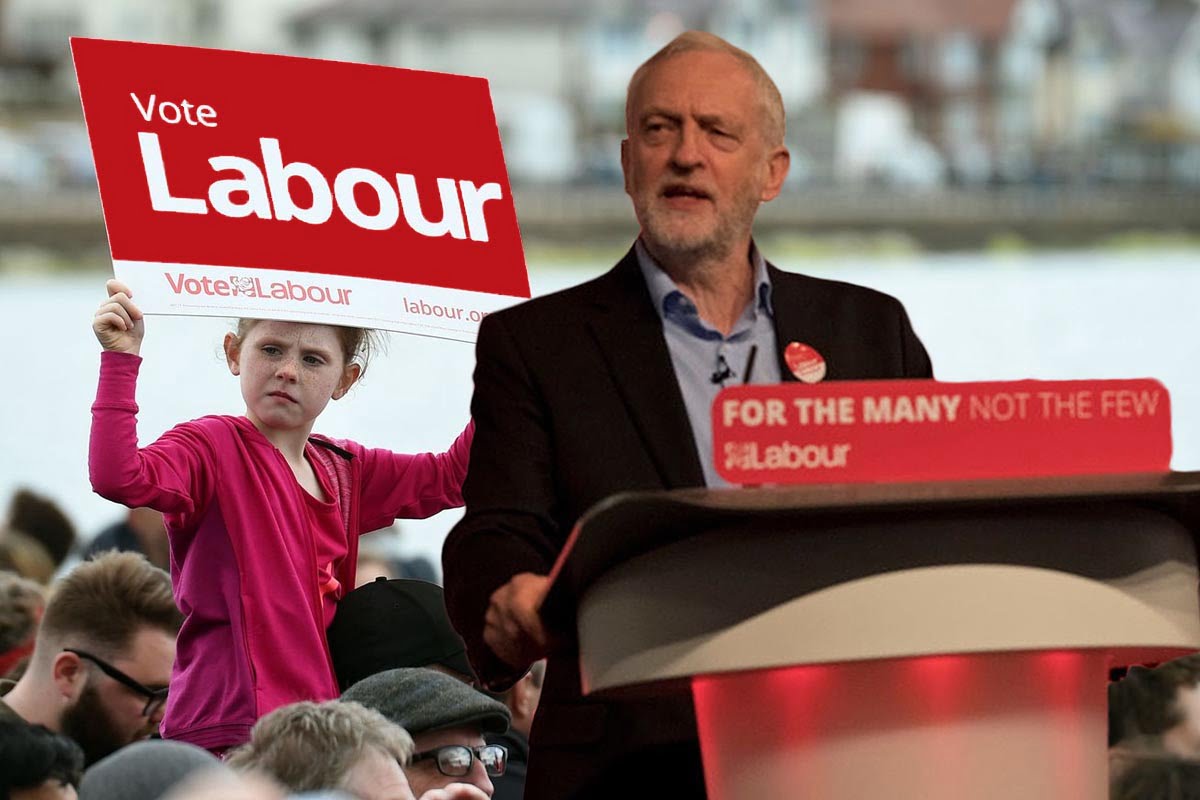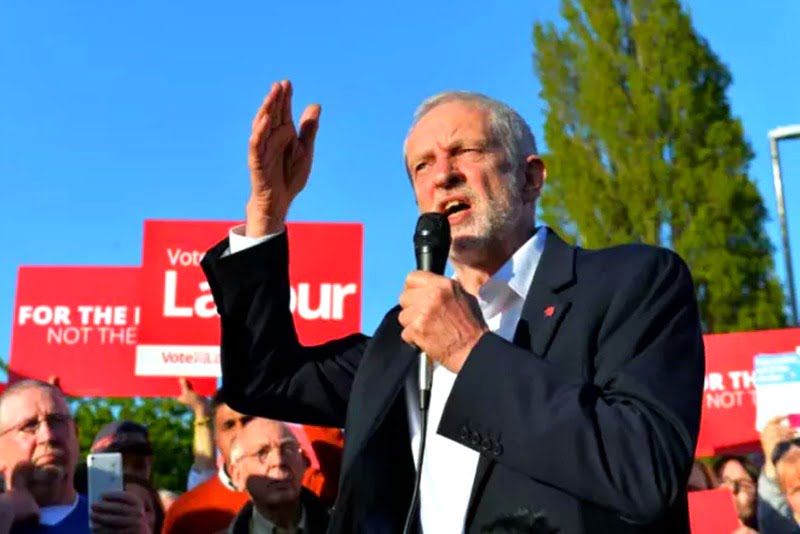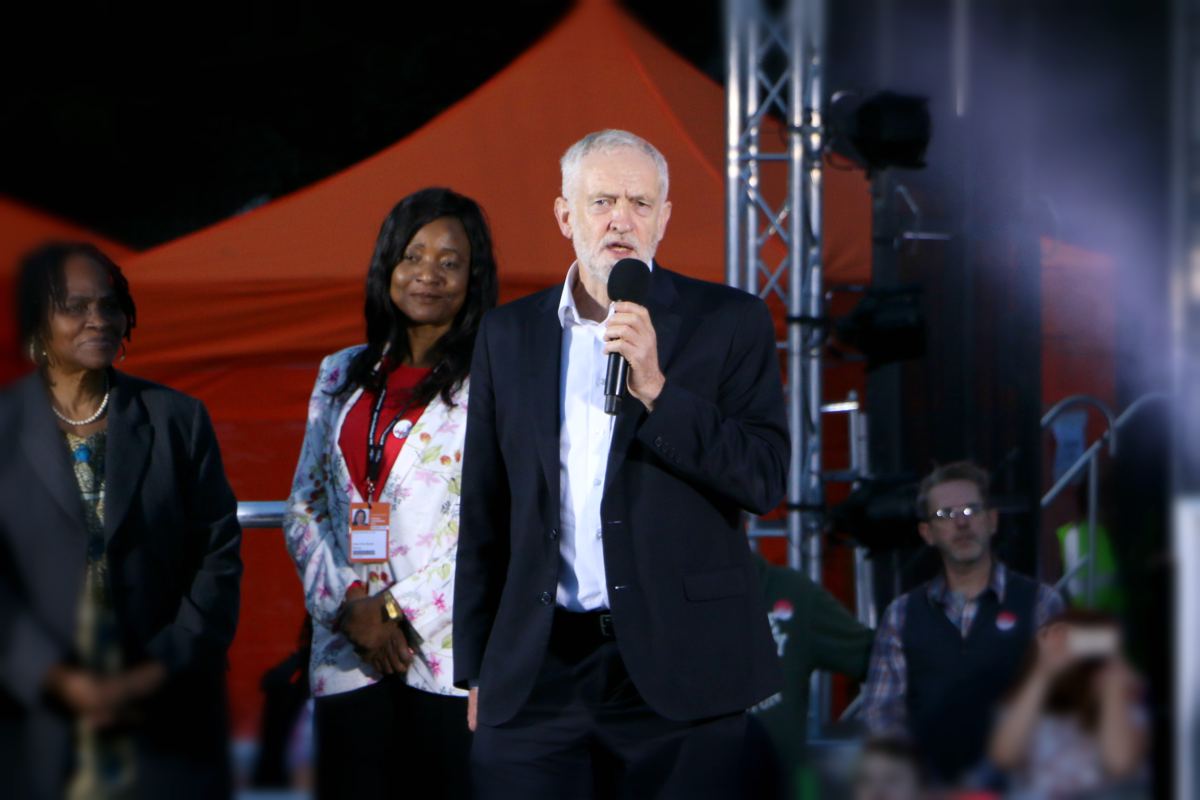Like the Labour Party manifesto at the most recent general election, Corbyn’s closing speech to the Labour conference last week has electrified the party, his supporters, and the Left in general by pushing the tone and policies significantly further to the left. The vital question is: how can we ensure that this programme is implemented?
Like the Labour Party manifesto at the most recent general election, Corbyn’s closing speech to the Labour conference last week has electrified the party, his supporters, and the Left in general by pushing the tone and policies significantly further to the left.
The programme and ideas outlined in this speech represent the boldest, most left-wing intervention in mainstream British politics in decades. What’s more, it carries with it the promise of implementation, since Labour look on course to win any upcoming general election.
For socialists, this represents the opportunity of a lifetime. We cannot let this chance to transform society slip through our fingers. It is imperative that all socialists fight for a Corbyn-led Labour government.
But that is only the beginning. We mustn’t be so naive as to think that all we must do is get Corbyn into Number 10. This much-welcomed programme of nationalisation, social housing construction, and universal free education threatens the privileges and power of the British ruling class, who have done nothing but demonstrate their intense hostility towards Corbyn ever since his name first got on the ballot.
Much of the speech, meanwhile, rightly pointed out that British capitalism has woefully low rates of investment, which has led to deindustrialisation and low-wage, insecure jobs. Behind many of the policy announcements, then, lies the promise of much more investment, and with it the threat (to big business and the banks) of higher taxes, more regulation, and public ownership.
We can therefore expect all kinds of sabotage to this programme and Corbyn’s government should it be elected.
The vital question therefore is: how can we ensure that this programme is implemented? How should socialists fight for these policies against the opposition of big business and the Establishment?
Housing
We all know that Britain is in an acute housing crisis. This is one of the biggest problems facing the working class. Corbyn plans to address this by passing legislation ensuring that “every home is fit for human habitation”, something the Tories recently voted down. This is absolutely correct.
He then went further and announced that “we will control rents…Rent controls exist in many cities across the world and I want our cities to have those powers too and tenants to have those protections.” Well-applied rent control would be an enormous respite for millions of people for whom rent has become a crippling burden.
But we have already heard the counterattack of the apologists for capitalism. They claim this policy does more damage than good because it will discourage investment by property developers and landlords.
As outrageous a claim this is, it is also true – we can only expect the profit-driven housing sector to scale back badly needed house building and refurbishment, since capitalists make investments to get profits. Significant rent controls (and they must be significant to make a difference to workers) cut profits.
There is a danger that these two policies – making all housing fit for human habitation and rent controls – will, under ‘market forces’, cancel each other out. To get housing fit for human habitation, we need much more investment.
The Labour movement must anticipate huge obstacles being put up to this. Speculation on the housing market has become key to parasitic British capitalism. We can’t make these parasites invest in good housing even now, let alone if we then slap rent controls on.
To really make a success of this policy, it must be controlled by us from start to finish. We must nationalise the big construction firms and landlords and embark on a massive programme of high quality social housing!
The same applies to Corbyn’s excellent announcement regarding the regeneration of council estates. He wants to give existing tenants a deciding say of their regeneration and to guarantee them new homes in the same place after regeneration is complete.
But the reason this is not currently done is because the private developers demand profits, and social housing is not profitable for them. Therefore, we cannot expect them to comply. If we want regeneration along these lines, which we do, the process must be carried out by the public sector from start to finish.
Investment
In general all of these proposals cost money – a lot of money. The right wing will argue this programme cannot be implemented because we don’t have the money; the state is already up to its eyeballs in debt.
Corbyn has two answers to this, which are good steps forward that we support. But in themselves they do not go nearly far enough.
Firstly, Corbyn said in his speech that we are “clear about how we would pay for it by asking the richest and the largest corporations to start paying their fair share.”
Quite right! The rich have only gotten richer and richer at the expense of everyone else. The money is there to pay for all these policies – in the rich’s pockets – and they must pay.
But will they pay? We need to do much more than simply to ask them. Even if we pass legislation compelling higher taxes on the rich, they will hide their money, something they are already adept at. We must expropriate the obscene fortunes of the billionaires that treat Britain as their playground.
Corbyn has gone much further than simply proposing higher taxes for the rich, however, and this is to be applauded. In his speech he said Labour must argue
“Not simply to redistribute within a system that isn’t delivering for most people but to transform that system. So we set out not only how we would protect public services but how we would rebuild and invest in our economy, with a publicly-owned engine of sustainable growth, driven by national and regional investment banks, to generate good jobs and prosperity in every region and nation.” (our emphasis)
This is a step in the right direction, because it is a step towards planning production, rather than leaving it in the hands of capitalists who we then tax a bit. However, it is only a step in that direction.
A public investment bank will not control what it is investing in, because that will be privately-owned and operating on the basis of capitalism.
As China has recently experienced, if the state funnels credit into capitalist businesses in an attempt to keep employment up, in a situation of stagnant demand and over-indebted consumers, these business will simply use the extra cash for speculation. Why build new factories if there isn’t the demand for their products, since the workers are too poor?
Hence to make a success of this policy, we must also own the businesses that this investment bank will be investing in “to generate good jobs and prosperity in every region and nation”. Then we can make sure they provide good jobs that make things that meet people’s needs.
Education
 Corbyn reiterated Labour’s policy of free and universal education as a public good. Far from being a ‘bourgeois bribe’ to middle-class kids, as the Guardian has laughably called it, this policy is about creating a society geared around meeting public needs, rather than the private profit of a few. We must therefore open up the education system to society and run it to meet the needs of society.
Corbyn reiterated Labour’s policy of free and universal education as a public good. Far from being a ‘bourgeois bribe’ to middle-class kids, as the Guardian has laughably called it, this policy is about creating a society geared around meeting public needs, rather than the private profit of a few. We must therefore open up the education system to society and run it to meet the needs of society.
This is an excellent policy which we can implement relatively easily. What is not so easy however is to connect this education system with the wider economy.
Despite the exorbitant fees, we still have the most educated young people in history. This has led to a generation of young job-seekers and workers who are far more educated than their jobs need them to be. The phenomenon of philosophy and history graduates spending years doing odd-jobs in the gig economy is all too familiar.
If we are to extend education still further, we need to make sure it doesn’t lead to even more highly educated unemployed and underemployed people. Hence, we need to control the wider economy and make sure it is invested in according to a plan to maximise the potential of our workers and meet the needs of the whole of society.
Nationalisation
To achieve such an economy clearly requires mass nationalisation. Corbyn has boldly put this on the agenda, with pledges to nationalise the railways and the utilities. In his speech, Corbyn attacked the parasitic capitalists who use instruments like private equity to squeeze profits out of, for instance, the water industry and run them down, knowing they have no competition anyway.
This pledge is extremely welcome after years of privatisation and the Thatcherite myth that ‘there is no alternative’, to which Blair et al. wholeheartedly subscribed.
But Corbyn’s plans for nationalisation are too timid for their own realisation. Labour plans to let the licences granted to these utility companies expire, rather than to nationalise them straight away. This will give them all the time in the world to undermine any public ownership plans: to cut back all investment, to move assets abroad etc. And by the time the licence expires Labour may be out of office.
We must be bolder and nationalise the utilities – and more – immediately, with no compensation!
Immigration and Wages
As we have always argued, the best way to defeat the racist rhetoric of the Tories, UKIP and others is with socialist policies. Blame the bosses, not the migrants! Corbyn echoed this by saying:
“We will never follow the Tories into the gutter of blaming migrants for the ills of society. It isn’t migrants who drive down wages and conditions but the worst bosses in collusion with a Conservative government that never misses a chance to attack trade unions and weaken people’s rights at work.
“Labour will take action to stop employers driving down pay and conditions not pander to scapegoating or racism.”
This is correct, but a little vague. Labour must begin by, at a bare minimum, repealing all the anti-trade union legislation and strongly backing trade unions to organise and fight for all workers, especially the most vulnerable, including immigrant workers. The unity of the working class is the only guarantee of better wages and conditions.
We would also add that it is not a question of singling out the ‘worst bosses’, but that it is the anarchy of capitalism, which pits people against each other in a struggle for scarce resources, that lays the basis for racism.
We can only overcome this by ending this anarchy through public ownership and a plan of production. Otherwise, low wages, unemployment and economic crises will persist and will continue to foster racism.
Democracy in the Workplace
 In what was perhaps the most radical announcement in his speech, Corbyn called for the development of workplace and community democracy all over society, to take power out of the narrow corridors of Westminster.
In what was perhaps the most radical announcement in his speech, Corbyn called for the development of workplace and community democracy all over society, to take power out of the narrow corridors of Westminster.
This is vital. Corbyn’s programme will face constant opposition and sabotage from big business, the media, and crucially, many of his own MPs and the army of civil servants in Westminster.
The only force he can rely on to fight for its implementation is the millions of working class supporters he has in society. They must be democratically organised up and down the country, from workplace to workplace, to ensure that his policies are implemented.
Unfortunately, this part of Corbyn’s speech was also the most vague. Ultimately, the principle of workplace democracy lies in sharp contradiction with that of private ownership.
If Corbyn’s government attempts to implement his plans for investment in high quality and affordable housing, we can expect that the unionised construction workers who would build such housing would naturally be supportive. Hence, giving them some democratic control over the construction firms in which they are employed would help ensure this policy’s implementation.
But these are private firms. They must obey the law of the market – to make as big a profit as possible, or be outcompeted by others. Even workers’ cooperatives must do this, or risk going bankrupt or losing business share to competitors.
Hence, to make a success of real workplace democracy, the workplace must be owned by the public and incorporated into a national plan of production, so that the workers can exercise their democratic control to the end of the common good and not the profit of their company.
Terrorism and Foreign Policy
Corbyn rightly pointed out that the plague of terrorism has been spread by imperialist interventions. He said Britain must “put our values of peace and cooperation into foreign policy”. He said a Labour government would oppose entirely the Saudi war against Yemen, and condemn Aung San Suu Kyi’s government’s ethnic cleansing of Rohingya muslims.
Again, this is all correct. But how do we successfully implement this?
Corbyn suggested appealing to the UN to organise conflict resolution. But the UN is completely impotent, depending as it does for all its power on the imperialist powers of the world. When the US wanted to invade Iraq, it ignored the UN and the UN could do nothing. And Saudi Arabia currently chairs the UN Human Rights Council, and in April of this year the UN elected Saudi Arabia to serve on the UN Commission on the Status of Women, a body “dedicated to the promotion of gender equality and the empowerment of women.”
It should be clear, therefore, that we cannot use the UN to spread peace and internationalism throughout the world.
Who would a Corbyn government be able to cooperate with to bring about peace and global justice? Who could it put its faith in? Only the international working class.
Just as in Britain, the only people Corbyn has been able to rely upon to elect him, to defend him and to fight for socialist ideas, have been the youth and the working class, so too internationally, the only organisations we can expect to fight for peace, for solidarity, and against racism, terrorism and exploitation, are the workers’ organisations and sister organisations of our trade unions. Workers’ solidarity is the basis of socialist internationalism.
Realise Corbyn’s speech – fight for socialism!
With his speech to the 2017 Labour conference, Corbyn has transformed the political landscape once again.
All socialists must not only fight for this programme, but also extend and deepen it, so that we can transform society forever by ending the anarchy, poverty and injustice of capitalism.






